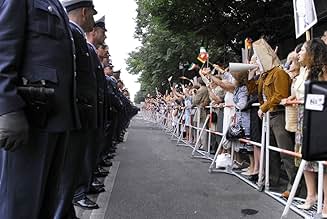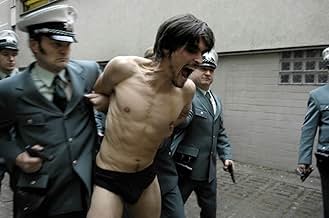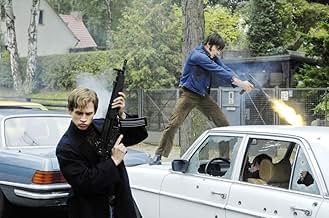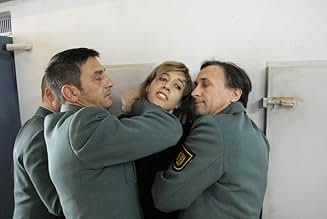IMDb RATING
7.3/10
41K
YOUR RATING
A look at Germany's terrorist group, The Red Army Faction (RAF), which organized bombings, robberies, kidnappings, and assassinations in the late 1960s and '70s.A look at Germany's terrorist group, The Red Army Faction (RAF), which organized bombings, robberies, kidnappings, and assassinations in the late 1960s and '70s.A look at Germany's terrorist group, The Red Army Faction (RAF), which organized bombings, robberies, kidnappings, and assassinations in the late 1960s and '70s.
- Director
- Writers
- Stars
- Nominated for 1 Oscar
- 4 wins & 22 nominations total
Niels-Bruno Schmidt
- Jan Carl Raspe
- (as Niels Bruno Schmidt)
Hans Werner Meyer
- Klaus-Rainer Röhl
- (as Hans-Werner Meyer)
- Director
- Writers
- All cast & crew
- Production, box office & more at IMDbPro
Featured reviews
I wish to clear up any mistake my summary for this might lead to: This is not poorly done. As for this being good or not, that is perhaps a little more subjective, as it may depend on your opinion of the RAF. This is another of the German films of recent years dealing with awful national situations of theirs, from a couple, to numerous, decades back. Whether it's therapeutic, apologetic, a third option or a mix of several that drives this trend, is up for debate. I find this and Der Untergang(or "Downfall") to be exceptionally well-done. As was also the case with that one, this requires you to pay close attention. The pace comes about as close to being outright overpowering - for two and a half hours straight, mind you - as it can, without crossing the line into it. This does also somewhat expect you to be familiar with the overall occurrences, otherwise, you may be confused and have trouble keeping track and following it. This is rather intense. It is a quite strong piece. Featured is an immense amount of violence, which is often graphic. The attitude towards nudity and sexuality is very relaxed. This is disturbing. It is by no means for the faint of heart, and mainstream audiences, if they give this a chance, should not expect it to be "enjoyable", in the traditional sense. It is not "funny". It is powerful. The cinematography and editing are excellent. The acting performances are beyond reproach. I don't know all the facts, but I understand that this isn't completely historically accurate, though it seems to come fairly close. The production values are incredible. I recommend this to anyone interested in an authentic drama based on the Rote Armee Fraktion. 8/10
Being aged, knowing most about the R.A.F story from the news when it happened (1970s) including the events in 1968 (Berlin, Prague , Mexico , U.S.A.) I am much more disappointed in this " big production' on a major theme in post war German (European) history, than most other critics up till now. If you know little or nothing about the subject, like many younger people, this may seem a " cool movie". Just as an action pic, you're right. However, what I miss, is the ideological context in which all this was happening. There is some mention of sectarian leftist groups, we see major mass protests of university students, etc. And the starting scenes in Berlin (visit of Sjah) are the main " background" to the " movement". (by the way, how many under 30 people knew about the Sjah of Persia, anyway? I even remember first spouse Soraya from the early 60's...). What I miss, is , an explanation of what and how on the mass student meetings, they are just shown. Also missing are the deeper context of postwar BRD (Germany) not having come to terms with the Nazi past, especially in the situation of many former NSDAP - symp's having high places in society, government, industry, etc. As I remember, that was one of the main frustrations in leftist circles ( and not only there...). Etcetera. In this respect, seeing the first gen. members of R.A.F. speeding to an unexplained action in BMW's on the " autobahn" as if they were fun-cruising L.A. in a Tarantino muscle-car flic while having My Generation by the Who on the stereo this all is quite unbelievable for people informed about that era. I don't believe these guys were jet-set-emulators. Jet-set was capitalist and thus their opposite social stratum. Which they fought , with all fatal results. And, why the story ending with the death of the first four, how shocking it may be? This whole episode is too much for one movie. As a Dutch proverb says: " they took too much hay on their fork". (meaning the makers of B.M. Komplex). genomen".
Although being somewhat more than moderately interested in politics, I knew very little about the original activities on which this film is based. Having seen the film, I now feel vastly more knowledgeable on how world events in the late sixties and early seventies led from the emergence to the demise of this particular left wing faction. My attention was fully engaged throughout the film. I thought the screenplay brilliantly portrayed the way the mindset of the RAF developed as they became more and more convinced they were living in a police state. Acting and direction were superb throughout. In spite of the violence and repression being depicted, I was reassured by the fact that such thought provoking films can and are being made for today's cinema audiences. After seeing Die Welle (I think it was three times) earlier this year I am now very enthusiastic about German cinema and shall certainly be hoping to see Der Baader Meinhof Komplex at least once more on the big screen this year. A masterpiece of political film making. Highly recommended.
Germans have a quality wave of movies that reached wold audience in the early 21st century, after the Run Lola Run hit. This movie is perhaps not the best of the best, but is interesting, original and gives a story of one turbulent era with great detail and precision.
The movie of Edel and Eichinger is fine when it comes to sets and costumes. It seems to catch the mood of the late Sixties and Seventies very well. Also the lead actors Bleibtreu, Wokalek and Gedeck have delivered outstanding performances. Too bad, that they don't get a chance to really explore their characters: Too much else is going on in this movie, that completely loses its focus during the last hour. The closer we get to the end, the more it resembles a documentary with a few scenes of play cut in now and then.
The viewer is presented with a lot of facts - and violence - but the movie fails in decoding the often cited "myth" of the RAF. For example, I've always wondered, whether Baader was just a criminal or really politically motivated. Well, in the first half of the movie, Baader is portrayed as an outlaw, who enjoys provocation and fast cars. Later he delivers sophisticated political statements. A good movie should at least try to explain this development. DER BAADER MEINHOF KOMPLEX doesn't.
The viewer is presented with a lot of facts - and violence - but the movie fails in decoding the often cited "myth" of the RAF. For example, I've always wondered, whether Baader was just a criminal or really politically motivated. Well, in the first half of the movie, Baader is portrayed as an outlaw, who enjoys provocation and fast cars. Later he delivers sophisticated political statements. A good movie should at least try to explain this development. DER BAADER MEINHOF KOMPLEX doesn't.
Did you know
- TriviaAs an immediate reaction to the movie, Ignes Ponto, widow of Jürgen Ponto, whose assassination is portrayed in the movie, returned her Federal Cross of Merit. She was angry that the Federal Republic of Germany has never even created a memorial for victims of the RAF, but instead helped to finance films like this one about the members of the RAF. Also, she said, she had not been warned about the graphic portrayal of Ponto's assassination when she was invited to the movie premiere and felt humiliated by the producers for making her sit through this without a warning. About a month later, she filed a lawsuit against the producers, who claimed that every scene is historically accurate, because the assassination of her husband, which she had to witness from the next room, was not portrayed as it happened. She demands the scene of the murder of her husband be cut from the movie. The filmmakers claim that they had tried to contact her during production to get the scene right but she had no desire to cooperate. Before this movie, there had been no portrayal of Ponto's assassination on film and she felt the staging of the movie was lurid and dishonoring to her husband. As of this writing, no decision has been reached about the lawsuit.
- GoofsUlrike Meinhof's twin daughters Bettina and Regine first appear in the opening scene in 1967 when they are 9 years old. Yet 3 years later when living in Sicily and rescued by Stefan Aust, they haven't aged at all.
- Quotes
Ulrike Meinhof: If you throw a stone, it's a crime. If a thousand stones are thrown, that's political. If you set fire to a car it's a crime; if a hundred cars are set on fire that's political.
- ConnectionsFeatured in Guinness World Records - Die größten Weltrekorde: Episode #5.1 (2008)
- SoundtracksMercedes Benz
Written by Janis Joplin, Michael McClure
Performed by Janis Joplin
Produced by Paul A. Rothchild
- How long is The Baader Meinhof Complex?Powered by Alexa
- What are the differences between the Theatrical Version and the Extended German Television Version?
- What is the scene at the beginning with the man being shot? How does it fit into the movie?
Details
- Release date
- Countries of origin
- Official site
- Languages
- Also known as
- The Baader Meinhof Complex
- Filming locations
- Production companies
- See more company credits at IMDbPro
Box office
- Budget
- €20,000,000 (estimated)
- Gross US & Canada
- $476,270
- Opening weekend US & Canada
- $17,348
- Aug 23, 2009
- Gross worldwide
- $26,937,355
- Runtime2 hours 30 minutes
- Color
- Sound mix
- Aspect ratio
- 1.85 : 1
Contribute to this page
Suggest an edit or add missing content






































